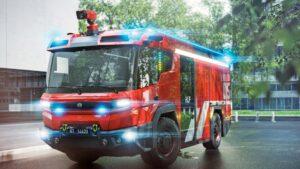
Photo Credit: cnn.com
You heard it right…the town of Paradise Valley is currently considering replacing part of its fire truck fleet with electric fire trucks. Why?
It comes in response to an allocation of funding from the American Rescue Plan Act enacted as a response to the Covid-19 crisis and the financial issues it caused in its wake. According to Mayor Jerry Bien-Willner, replacing a fire truck or several was going to be a relatively short-term concern anyway, so they are considering using the funds towards that end, as well as other needs. He also notes the proliferation of electric vehicles and how that trend is moving steadily upward; a very fair point, as Tesla vehicles went from a novelty to widespread within a 10 year period, and nearly all car manufacturers are developing their own electric fleets.
That said, electric cars are one thing but electric fire trucks are a different breed. They have not yet moved down the cost curve via large-scale production like Tesla has with sedans. Their massive size and torque necessary to power them pushes the limits of battery technology, which we collectively have not made steady, large leaps with like we have computing technology. Indeed, the representative of the electric truck company was a bit vague in his responses to this end.
The closest analogy with more widespread adoption would be electric school buses, which currently cost more than double what a diesel-powered school bus does and have largely been dependent on grants from blue states, helping push them down the cost curve. No such specific grants exist for electric fire trucks in Arizona though.
It is certainly an interesting idea, and one that must be considered for the future. However, we don’t elect officials so they can help private enterprise make their production processes more efficient, nor to inefficiently allocate capital in a desire to look forward-thinking. We elect them to be good stewards of taxpayer funds, which even though it is federal money, it is money that all of us taxpayers will be paying down. The most prudent, taxpayer-friendly decision would be to revisit this concept after manufacturers have enough production under their belts to materially drop prices to the point where they are competitive with diesel-powered trucks. Perhaps a decade or two from now we should revisit, but this isn’t the right time.

